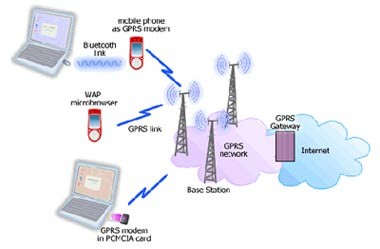Global System for Mobile Communications
GSM (Global System for Mobile Communications, originally Groupe Spécial Mobile), is a standard developed by the European Telecommunications Standards Institute (ETSI) to describe protocols for second-generation (2G) digital cellular networks used by mobile phones. As of 2014 it has become the default global standard for mobile communications - with over 90% market share, operating in over 219 countries and territories.
GSM - User Services
GSM has much more to offer than voice telephony. Additional services allow you greater flexibility in where and when you use your phone. You should contact your local GSM network operator for information on the specific services available to you.
But there are three basic types of services offered through GSM which you can ask for:
Telephony (also referred to as teleservices) Services
Data (also referred to as bearer services) Services.
Supplementary Services
Teleservices or Telephony Services:
A Teleservice utilises the capabilities of a Bearer Service to transport data, defining which capabilities are required and how they should be set up.
Voice Calls:
The most basic Teleservice supported by GSM is telephony. This includes Full-rate speech at 13
Kbps and emergency calls, where the nearest emergency- service provider is notified by dialing three digits. A very basic example of emergency service is 911 service available in USA.

Videotext and Facsmile:
Another group of teleservices includes Videotext access, Teletex transmission, Facsimile alternate speech and facsimile Group 3, Automatic facsimile Group 3 etc.
Short Text Messages:
SMS (Short Messaging Service) service is a text messaging which allow you to send and receive text messages on your GSM Mobile phone. Services available from many of the world's GSM networks today - in addition to simple user generated text message services - include news, sport, financial, language and location based services, as well as many early examples of mobile commerce such as stocks and share prices, mobile banking facilities and leisure booking services.
Bearer Services or Data Services
Using your GSM phone to receive and send data is the essential building block leading to widespread mobile Internet access and mobile data transfer. GSM currently has a data transfer rate of 9.6k. New developments that will push up data transfer rates for GSM users are HSCSD (high speed circuit switched data) and GPRS (general packet radio service) are now available.
Supplementary Services
Supplementary services are provided on top of teleservices or bearer services, and include features such as caller identification, call forwarding, call waiting, multi-party conversations, and barring of outgoing (international) calls, among others. A brief description of supplementary services is given here:
Multiparty Service or conferencing: The multiparty service allows a mobile subscriber to establish a multiparty conversation, i.e., a simultaneous conversation between three or more subscribers to setup a conference call. This service is only applicable to normal telephony.
Call Waiting: This service allows a mobile subscriber to be notified of an incoming call during a conversation. The subscriber can answer, reject, or ignore the incoming call. Call waiting is applicable to all GSM telecommunications services using a circuit- switched connection.
Call Hold: This service allows a subscriber to put an incoming call on hold and then resume this call. The call hold service is only applicable to normal telephony.
Call Forwarding: The Call Forwarding Supplementary Service is used to divert calls from the original recipient to another number, and is normally set up by the subscriber himself. It can be used by the subscriber to divert calls from the Mobile Station when the subscriber is not available, and so to ensure that calls are not lost. A typical scenario would be a salesperson turns off his mobile phone during a meeting with customers, but does not with to lose potential sales leads while he is unavailable.

